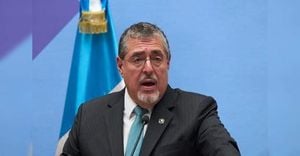Escalation and restraint characterize the recent developments around the European Union's tariffs on Chinese electric vehicles (EVs), as the stakes rise in what many see as a brewing trade war between two of the world's biggest players. On October 5, 2024, the EU approved increased tariffs on electric vehicles imported from China, igniting more friction amid fears of damaging economic repercussions. Reuters reports the imposition of these tariffs was seen as the EU's move to protect its burgeoning EV market, which has been under threat from China's rapidly advancing automotive sector.
The EU's new tariff structure, targeting specific manufacturers, brings additional if not overly punitive measures compared to those enacted by the U.S. and Canada, which imposed blanket tariffs on all vehicles made in China. The EU, on the other hand, set tariffs varying from 17.4% for BYD to as high as 37.6% for manufacturers like SAIC and for any other non-compliant brands. Meanwhile, Tesla emerged as the victor, managing to reduce its tariffs to just 9% from an earlier 20.8%. This nuanced approach reflects Europe's complex automotive ecosystem, balancing encouragement of local production with the need to maintain trade relations.
According to Bloomberg, the Chinese government is urging its domestic automakers to scale back their ambitions within the EU following the proposed tariffs. This includes halting expansions and new partnerships, which indicates Beijing's concern over its automotive brands facing severe trade barriers. Essentially, it’s about limiting exposure to continuous trade tensions, with sources close to the matter confirming these warnings were not mere suggestions but strong hints coming from the upper echelons of Chinese decision-making.
On the ground, the response to these tariffs has already been felt, as illustrated by Dongfeng Motor Group's cessation of plans to build vehicles in Italy. The company cited Italy’s support for the EU tariffs as the reason behind its strategic retreat. This decision is also reflective of broader worries within China about its manufacturers facing overcapacity issues—largely attributed to European consumers' cooling interest following subsidy cuts. For Prime Minister Giorgia Meloni of Italy, this is especially disappointing as previous attempts to stimulate local manufacturing through foreign investment are now being undermined.
Italy's very attempt to lure investment from companies like Dongfeng, which peaked during Minister Adolfo Urso's recent trip to China, is now seen as tainted by the EU's recent tariff decisions. Urso's unsuccessful dealings with Dongfeng to formalize relationships contrasts sharply with the optimism previously held. Instead, the narrative has shifted toward loss and caution.
This debacle serves to highlight larger themes of the EU's internal divisions and the precarious balance between member states' interests. The votes on these tariffs showcased stark differences; only France and Italy supported them, whereas heavyweights like Germany, quite dependent on the Chinese market, voted against. The Germans are acutely aware of their companies' need for the Chinese market, particularly as brands like Volkswagen face steep declines amid shifting consumer preferences.
When it’s all said and done, profits from sales within China had been propping up many European manufacturers. With such profits dwindling, major companies are steering their operations carefully, and Volkswagen has gone as far as indicating the potential for factory closures—a first for the brand. This multifaceted economic dance raises pivotal questions about the future of European automakers and their capacity to adapt within the increasingly competitive global market.
China’s counterclaims to EU accusations of unfair subsidies claim violations are equally substantial, with the Chinese government hinting at retaliatory measures against EU goods, including dairy and pork. The stakes for both sides are tremendous, underscored by principles of fairness and the need for self-sufficiency.
While the immediate impact of these tariffs appears unfavorable for Chinese manufacturers—affecting brands like Nio and MG—many are still pursuing new opportunities within the EU, albeit under more strained circumstances. BYD appears undeterred, moving forward with plans for its factory in Hungary, hoping to facilitate access to the European market and soften the blow from burgeoning tariffs.
The situation remains fluid, as hopes for diplomatic resolution linger. The EU and China have expressed willingness to negotiate and seek alternatives to levies, but as the shifting dynamics and national interests collide, the chance of resolution remains uncertain. The reality on the ground appears quite different from the political assertions, with automobile makers from both sides holding their breath as the first year post-tariff begins.
What's clear is the growing tension swirling around trade, technology, and the auto industry sets the stage for potential long-lasting shifts not just for Chinese and European manufacturers, but for global automotive standards. The changing relationships and trade agreements will have far-reaching effects as both parties navigate through the trade-induced turbulence with responses reflective of economic nationalism and long-term strategy.



